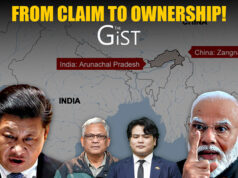Today, we’re diving into a truly riveting tale—a piece of South Asian political fan-fiction so dramatic, even Netflix would want to tone it down.
And it’s based on an op-ed in the Dhaka Tribune, globally known for its deeply unbiased journalism. You’ll soon see why.
Let’s set the scene. It’s August in Dhaka, and the air is heavy with celebrations because the tyrant Prime Minister Sheikh Hasina has fled to India after failing to put down a ‘student’ uprising.
Soon afterwards, somewhere, someone decides that the man parachuted in from the United States of America to replace her, Professor Muhammad Yunus— yes, the Nobel Peace Prize-winning, microfinance-pioneering, suit-wearing poster child of boringly sincere do-gooders—is secretly an Islamist warlord planning to genocide Hindus and Taliban-ify Bangladesh.
Because when you think “militant extremism,” you obviously picture a 70-something man with a PhD and a TED Talk.
Apparently, this revelation came courtesy of the “Hasina Government’s propaganda machine” working hand-in-hand with “BJP troll networks.” The iron lady of Dhaka, who is now allegedly sipping masala chai in Delhi surrounded by SPG commandos and retired television anchors while plotting her comeback like a Bengali Lady Macbeth, apparently has more clout in Delhi than in Dhaka.
But wait—it gets richer.
While Yunus is being defended internationally as the second coming of Gandhi, actual things are happening on the ground. Real things. Like the release of convicted Islamist terrorists— without even an “ooops’ from the new caretaker government. That Yunus heads.
Also, the UN — yes, that boring old bureaucracy in New York –drops a report saying Bangladeshi Hindus were subjected to violent mob attacks. Not tweets. Not fake news. Actual violence.
But don’t worry, everyone’s too busy fighting off a fake Islamist narrative to notice the real Islamist problem in office.
Imagine:
- A Nobel Laureate is accused of being a terrorist.
- The actual terrorists are let out of prison
- And the person who suppressed Islamic extremism for 15 years is now in exile in India, being blamed for a narrative that, ironically, might not be that far off the mark after all.
Now, if this all sounds like the plot of a rejected Tom Clancy novel, don’t worry—it gets better.The Dhaka Tribune article claims this was a “textbook case of narrative warfare.”
Right. Like someone flipped through Narrative Warfare for Dummies and said, “Yes, let’s accuse a peace activist of ethnic cleansing. That’ll work.”
The intent of this campaign, we’re told, was singular: To destabilise the interim government of Bangladesh. And the masterstroke of this plan? Tens of thousands of social media posts coordinated with all the subtlety of a flash mob doing a dandiya on Dhaka’s main parade ground.
But wait—here comes the twist! Bangladesh’s Generation Z— those chronically online, highly caffeinated keyboard warriors— immediately sniffed out the whole thing. Because nothing gets past TikTok detectives and Reddit sleuths, particularly those with a mildly jihadi mindset.
They responded, the article says, with a wave of anti-India rhetoric. But don’t worry—it wasn’t xenophobic. It was just strategic outrage! A patriotic tantrum, if you will.
Now comes my favourite part: the collapse. The disinformation campaign, despite allegedly costing millions, disintegrated faster than a Bangladeshi SIM card in roaming. Why? Because, says the article, international actors apparently did basic due diligence.
And lo and behold! The world rallied behind Yunus. Everyone from Brussels to Beijing, Seoul to Santa’s Workshop declared him the democratic messiah of Bangladesh. Meanwhile, poor Hasina gets painted as a moustache-twirling dictator who eats democracy for breakfast and hoards kleptocracy like Bitcoins.
Now, don’t get me wrong—criticism of authoritarianism is fair game. But turning this into a Bollywood villain origin story complete with cross-border conspiracies and youth-led cyber rebellions reeks of geopolitical absurdity.
Finally, the author of the op-ed issues a demand to India: “Tell your media to stop trolling us, or face eternal cancellation by Gen Z Dhaka.”
Because nothing frightens a nuclear state like getting unfollowed by a teenager in Dhanmondi.
And now, the pièce de résistance:
The author then goes on to plead with Modi to tell Indian media to be nicer. Which is adorable. Like asking a Bengal tiger to stop biting because it’s scaring the deer.
And here’s the best part. The author of this masterpiece—the one lecturing us about narrative warfare, regional geopolitics, the psychology of Gen Z, Indian media ecosystems, UN diplomacy, and apparently the metaphysical essence of truth itself—…is a “global marketing professional.”
Which, as the Dhaka Tribune will tell you, is the universally accepted credential for diagnosing international disinformation conspiracies and rewriting South Asian political history.
In conclusion—if you’re going to invent a conspiracy, at least try harder. Next time, add aliens. Or time travel. Maybe Professor Yunus is actually a cyborg sent by Grameen Bank from the future to destroy BRICS. Which in turn wants to turn him into a anti-dollar demon. I’d watch that for sure.
But if you are looking for real, candid opinions about what is going down in Bangladesh from people who have studied the country for decades, wait for part II of our roundtable on Bangladesh.
Coming soon, only on StratnewsGlobal.
In a career spanning three decades and counting, Ramananda (Ram to his friends) has been the foreign editor of The Telegraph, Outlook Magazine and the New Indian Express. He helped set up rediff.com’s editorial operations in San Jose and New York, helmed sify.com, and was the founder editor of India.com.
His work has featured in national and international publications like the Al Jazeera Centre for Studies, Global Times and Ashahi Shimbun. But his one constant over all these years, he says, has been the attempt to understand rising India’s place in the world.
He can rustle up a mean salad, his oil-less pepper chicken is to die for, and all it takes is some beer and rhythm and blues to rock his soul.
Talk to him about foreign and strategic affairs, media, South Asia, China, and of course India.




